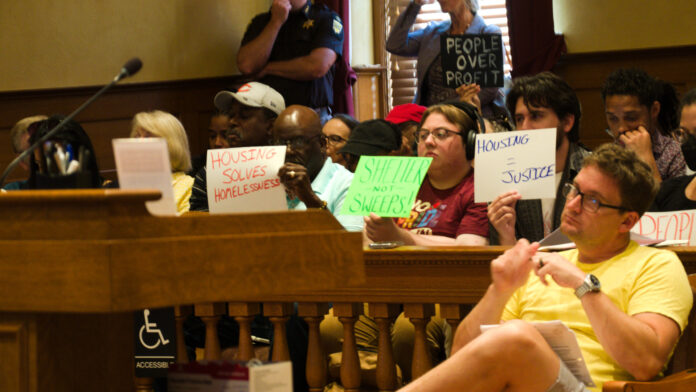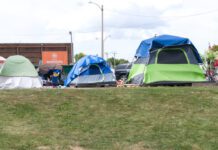Spicy debate at Peoria City Council over a proposed anti-camping ordinance aimed at the growing number of homeless encampments in the city.
A recent Supreme Court Ruling, City of Grants Pass v. Johnson, overturned previous court restrictions on how cities can restrict or eliminate homeless encampments. Cities across the country are racing to pass new ordinances aimed at removing homeless encampments from public property.
City staff presented this ordinance as “a progressive method of interdicting camping on public property.”
The Peoria Fire Department provided the city council with a list of 35 incidents requiring Fire and/or Emergency Medical Services (EMS) from August 3rd, 2022-July 3rd, 2024 at five different homeless encampment locations: between OYO Motel and Family House Mansion on Knoxville, Landmark, Fayette Street, Washington Street, and Springdale Cemetery.
The city claims that from December 2022 to October 2023 the cost to abate these encampments to the city is $30,789. They did not provide an estimated cost of the Fire/EMS incidents.
Homelessness has reached record highs in the nation. On any given night, over 600,000 people are homeless meaning they lack “a fixed, regular, and adequate nighttime residence” according to a 2023 Department of Housing & Urban Development (HUD) Report to Congress. A 2020 HUD report says homeless encampments have increased to hitherto unseen numbers in over a century.
According to Kshe Bernard of LULA Street Support for the Unhoused, there are approximately 414 people experiencing homelessness in Peoria and only 348 beds available at the various homeless shelters in Peoria. Of these, 291 adults are adults and 123 are children. There are only 264 beds for adults and 84 beds for children. This does not reflect domestic violence shelters, and these numbers are only estimates.
The proposed ordinance would make it unlawful for any person to camp or store property on any public property including: streets, bridges, and parks. Penalties for violating this ordinance are:
- 1st violation – one hundred dollars ($100.00) but no more than two hundred fifty dollars ($250.00);
- 2nd violation within 180 day period – two hundred fifty dollars ($250.00) but no more than five hundred dollars ($500.00);
- 3rd violation within 180 day period – ($500.00) but no more than seven hundred fifty dollars ($750.00) or incarceration for a period not exceeding the maximum time allowed pursuant to Section 1-2-9 of the Illinois Municipal Code (65 ILCS 5/1-2-9).
During his public comment, homeless advocate Aaron Slaughter expressed doubt that 180 days was even enough time to get people the resources they to be housed. “I can’t even see any of these programs getting people done in a 180 days,” he said.
The ordinance further states: “Each occurrence of a violation of this chapter or, in the case of a continuous violation, each day a violation occurs or continues, may constitute a separate offense and may be punished separately.”
City staff further argued that the possibility of incarceration after a third violation under this ordinance was not as harsh as it could be. Normally, Trespass on Public Land is a Class A Misdemeanor punishable up to a year in jail. The proposed ordinance would only set a maximum of six months of incarceration.
The ordinance states that any property taken by the city would be kept for thirty days. Individuals would be able to retrieve their property within that time period before it is discarded.
Kshe Bernard stated, “I am present most of the time when the city clears [en]camp[ments]. Getting that property back in good condition is a nightmare. It is one I cannot navigate with all the resources [and] all the support in the city from the people who actually care.”
Finally, even sleeping in ones vehicle could potentially be punishable under this ordinance. The ordinance includes “campers, recreational vehicles, or trailers” under its definition of “camp facilities.”
Mayor Rita Ali expressed mixed opinion regarding the drafted ordinance:
“I consider this a draft ordinance, because I think it requires some tweaking,” she said. “We want to end homelessness on the streets of this country. But, I think we have to do it in strategic and humane method. I want to make sure we’re not criminalizing homelessness in the City of Peoria. There’s a way [to address homelessness] to do it without jail or excessive fines, because it doesn’t work. It’s been proven not to work. We have to let people know that street homelessness is no longer allowed or acceptable in the city of Peoria. Stronger [enforcement] measures need to go to those that refuse services, who refuse to be housed, who refuse wrap-around support, who refuse substance treatment, who refuse trauma informed services. There’s a population, we suspect, maybe 20%-25% of people that live in encampments that will refuse any services. Those are the individuals we need to have stronger policies towards. Where is the emergency shelter? What is the plan in terms of how we identify [which] encampments [need to be addressed]? I recommend not using police because, it’s not best practice. There’s a cost to this. $30,000 is nothing compared to the costs to address homelessness and the removal of these encampments. I do think it’s important to get people off the street and on a path to having homes.”
Ali shared with the council a document entitled 19 Strategies for Communities to Address Encampments Humanely and Effectively.
District Two Councilman Chuck Grayeb had a very different opinion than Ali and ranted against council members and homeless advocates for what he perceived as inaction and a derogation of duty to the propertied residents of Peoria. He stated that the homeless people are living like animals. Most speakers during public comment interpreted this as Grayeb calling homeless people animals.
“I’m going to speak for the people of Peoria. People I represent have nothing but compassion for the people who are unhoused and who are living like animals outside… like animals. Yes, like animals! We are trying to do something about it. Nobody is trying to be punitive.
“It is absolutely ridiculous to say anything we do to deal with an issue is punitive. You explain to the business people downtown—who have spent millions of dollars to attract people here—how it makes sense for people to get out of their cars in parking decks and we have urination and defecation in our stairwells. How do we keep real estate values where they need to be when we have a homeless encampment nearby a proud neighborhood with people shooting up in broad daylight and then blame the police department because the put lights there to discourage people from shooting up and possibly killing themselves? Our homeless people are about twice as likely to die twenty years earlier than everyone else.
“I don’t want to hear we’re moving to hastily on anything. How many years have I been complaining about this? If we pass something here that is meaningless, we will have betrayed the public. As for the idea we’re going to criminalize someone; hey, it takes two to tango. This is absolutely ridiculous; we’re trying to vilify the people of Peoria and their elected representatives for trying to get a hold of this problem. We’re trying to save these people who are unhoused from an untimely death.
“We do not allow people in Peoria to live in homes without electricity, running water, and plumbing. Why would it be okay for them to live outside in encampments?
“Last I looked, nobody should be above the law in this country. Well, that means everybody. And, to the extent you put anybody above the law this body passes, we’re on very dangerous ground.”
During public comment, District 2 resident Nicholas Hall said he was confused by Grayeb’s comments. Hall claims he spoke to Grayeb several weeks prior about the issue of homeless encampments, and during this conversation, Grayeb said their was no plan for the city to pass a resolution which would criminalize homelessness.
Grayeb has announced he plans to challenge Mayor Ali in the 2025 Mayoral election. This was no doubt his first of many campaign speeches he plans to give. Grayeb is a long-time landlord, union supporter, and holds strong support for police. Him and Ali will also be running against At-Large City Councilman John “Mr. Growth” Kelly.
In an unrelated note, later in the meeting Grayeb appeared near tears as he described a sad story of a raccoon family allegedly killed in a trash compacter.
Thirty-three residents gave public comment regarding this anti-encampment ordinance: one in support, thirty-two strongly opposed.
Noah Palm of the Peoria Chapter of the ACLU, says the ACLU opposes the ordinance for the following reasons:
- The ordinance as drafted is cruel. Criminalizing people sleeping in parks when they have no where else to go.
- Ordinance disproportionately affects people of color and disabilities.
- Expansion of the power of police to search & seize people’s property without a warrant in violation of the fourth amendment.
- Levying fines and penalties against those who are already experiencing difficulty in housing only intensifies their financial insecurity making it less likely they’ll be able to find permanent housing.
The last speaker, Douglas Stacy, spoke about being homeless, a needle junkie, and his heavy addiction to Methamphetamine, cocaine, and heroin. He’s been sober for fifteen months, and he talked about how he realized his voice was powerful enough to bring other people back from addiction. He admitted that while he was homeless and abusing substances, he sometimes defecated in stair wells. He apologized to the council for that.
He claimed that at least $12,000 of the over $30,000 the city reported spending was spent on him and his people. “A good majority of those people are housed & sober now.”
The City Council meeting was over five hours long, and public comment lasted past midnight.
The anti-encampment ordinance is not on the August 27th, 2024 City Council agenda. But, it could be brought back before the council at any future meeting and will likely engender further furious debate over how the city should address the growing homeless problem.

























